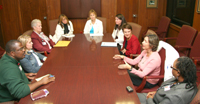|
|
| |
|
| Multidisciplinary forum, therapeutic service for caregivers slated |
by Megan Fink
Public Relations
Whether it’s handling a case of a colleague becoming a patient, or
working with families to properly execute a dying patient’s wishes,
health care providers face many difficult emotional and ethical issues
on the job. To provide support in dealing with these challenging
issues, a new program at MUSC will offer a confidential, therapeutic
forum for caregivers.
 Schwartz
Center Rounds planning group members, from left, the Rev. John Bosco
Ikemeh, Ashley Lauresen, R.N.; Eva Petenbrink, Dr. Alice Boylan, Susan
Beason, R.N.; Dr. Dee Ford, Dr. Lilless Shilling, Dr. Ramita Bonadonna,
and Cherlyn Monroe discuss the impact of a particular case as practice
for the first rounds scheduled for Nov. 7. Schwartz
Center Rounds planning group members, from left, the Rev. John Bosco
Ikemeh, Ashley Lauresen, R.N.; Eva Petenbrink, Dr. Alice Boylan, Susan
Beason, R.N.; Dr. Dee Ford, Dr. Lilless Shilling, Dr. Ramita Bonadonna,
and Cherlyn Monroe discuss the impact of a particular case as practice
for the first rounds scheduled for Nov. 7.
Schwartz Center Rounds is a nationwide program that began 12 years ago
at Massachusetts General Hospital and has since been adopted at 148
sites in 29 states. MUSC is the only hospital in South Carolina to
offer its employees this type of service.
“Outcomes of Schwartz Rounds at other institutions include support
among the health care team and more participation as a team,” said
Ramita Bonadonna, Ph.D., R.N., MUSC Schwartz Center Rounds program
coordinator and psychiatric consultation liaison nurse for Therapeutic
Services. “Talking about the social and emotional aspects of the work
we do helps us develop empathy for each other and for our patients by
emphasizing our common humanity. Teams of clinicians develop peer
relationships rather than hierarchical ones, and begin to learn from
each other while improving communication.” Other benefits are less
stress and anxiety, and a higher job satisfaction for providers.
Submitted and selected cases are brought to a planning committee, which
includes a chaplain, social worker, nurses, doctors, and facilitators
from several departments. At the Schwartz Center Rounds, which is
funded through a Schwartz Center grant, attendees discuss the impact of
a particular case and receive insight from a rotating clinical panel.
Rounds are both confidential from a patient and provider perspective in
that case individuals’ identities are withheld. Providers are
encouraged to share lessons learned with their clinical group while
maintaining the confidentiality of group participants.
“It starts with the initial group that participates in the rounds,”
said Dee Ford, M.D., physician leader for the MUSC Schwartz Center
Rounds, medical director for Palliative Care, and assistant professor
of Medicine. “Then you get people that come to the cases they were
individually involved in, and they take different attitudes back to
their workplace. These attitudes percolate throughout the institution.
The rounds themselves are pivotal, but the ripple effect is what will
really be exciting to see.”
Examples of cases to be discussed would deal with unrealistic
patient/family expectations, delivering bad news, carrying out charity
care when resources have run dry, working with the elderly, pain
management, and losing a patient. “We can’t give from an empty cup,”
Bonadonna said. “We can’t turn off our hearts at work and expect to
open them at home. Yet, if we open up all the time, we feel drained.”
Schwartz Center Rounds will be held the first Friday of every month
from noon-1 p.m. in Gazes Auditorium starting Nov. 7. Rounds are open
to all hospital and university employees, trainees and students who are
encouraged to bring cases to the planning group. Lunch will be
provided.
For more information, visit http://www.theschwartzcenter.org/programs/rounds.html, or submit a case for discussion by e-mailing bonadonr@musc.edu or 792-6657.
Friday, Oct. 24, 2008
|
|
|


